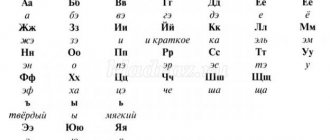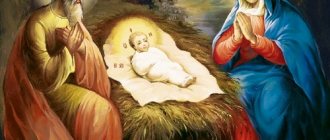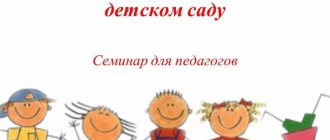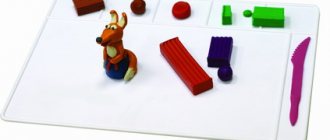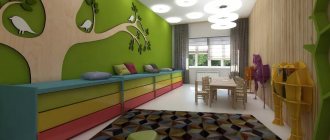Long-term plan for organized educational activities in the Russian language in the senior group
Ni Aliya
Perspective plan for organized educational activities in the Russian language in the senior group
Long-term plan for organized educational activities
for the older group .
Educational field: Communication.
«Russian language in groups with the state language of instruction».
No. Content Number of organized educational activities Timing
1 Topic: “Meeting, greeting”
Goal: Introduce words denoting greeting, farewell into the children’s dictionary, teach them to use words in accordance with the rules of the Russian language (hello, goodbye)
5
Goal: Enriching children's vocabulary through the names of toys,
primary colors, adjectives and numerals within six. 5
3 Topic: “Wild and domestic animals.”
Goal: Enrichment of active vocabulary with nouns,
meaning domestic, wild animals, birds and their young, gla-
heads indicating the actions of animals and people. 7
4 Topic: “Vegetables and fruits.”
Goal: Initial accumulation and active assimilation of new lexical units on the topic through the names of vegetables and fruits, primary colors and adjectives “big”
,
“small”
, etc. 8
Purpose: To introduce the names of body parts. Create conditions for developing skills to coordinate issues
Strong pronouns (whose, whose, whose)
and possessive pronouns
(my, my, my)
with nouns. 4
Goal: Enriching children's vocabulary with nouns denoting family members (mom, dad, grandmother, grandfather, girl, boy, sister, brother, daughter, son, pieces of furniture, verbs denoting actions (washes, plays, knits, waters, draws, stands , lives, etc.)
8
7 Topic: “Utensils and food.”
Goal: Formation of skills to coordinate adjectives with nouns in gender and number (big cup, small plates, etc.)
. 8
8 Topic: “Clothes and shoes”
Goal: Development of understanding of speech, expansion of vocabulary through new lexical units on the topic. 7
9 Topic: “In the garden and vegetable garden”
Goal: Enriching the active vocabulary with nouns denoting vegetables and fruits, adjectives denoting the attribute and property of an object (sweet, round, yellow, etc.)
. Developing the skills and abilities to understand and use interrogative sentences in speech with the word where, to whom? from whom? 5
Goal: Formation and development of listening and speaking skills in familiar and new game learning situations on completed topics and on the topic “Transport”
. 5
11 Topic: “Our favorite fairy tales”
Goal: developing skills in understanding text through reading, instilling interest in Russian folk tales 6
12 Repetition. Purpose: generalization and systematization of acquired knowledge. 4
Enrichment of vocabulary for the development of coherent speech of the child. Without a vocabulary, there is no coherent speech, there is no dynamics in the development of narrative and dialogic speech. Work on enriching vocabulary.
Technological map of organized educational activities for the development of bilingual speech for the middle group “My toys” Technological map of organized educational activities for the middle group Educational areas: “Communication” Section: Development.
Source
Notes on educational activities in the Russian language in the senior group “Favorite time of the year”
Shonchalai Shanmak
Notes on educational activities in the Russian language in the senior group “Favorite time of the year”
Abstract of GCD in the Russian language in the senior group.
Conducted by the teacher of the senior group of MBDOU d/s "Khunchugesh"
With. Ak-Durug Shanmak Sh. O.
Topic: Favorite time of year
Goal: formation and development of skills and abilities of practical knowledge of the Russian language in oral form . Continue to introduce children to words meaning seasons - autumn , winter, spring, summer. Learn to make short sentences based on a picture, distinguish the seasons , understand and use words denoting the seasons . Repeat the words of the topic: Colors. Develop coherent speech and enrich children's vocabulary. Foster interest and respect for the Russian language .
Work on the pronunciation of voiced and soft consonants.
Visual aids: doll, images of the seasons ; snowflakes, flowers, green and yellow leaves cut out of paper.
Summary of a lesson on teaching children the Russian language in the school preparatory group “Soon to school”
Guzel Mingazova
Summary of a lesson on teaching children the Russian language in the school preparatory group “Soon to school”
Structural unit of MBOU "Taktalachukskaya secondary school"
preschool educational institution "Taktalachuk kindergarten"
Aktanysh municipal district of the Republic of Tatarstan
Summary of a lesson on teaching children the Russian language
in the preparatory school group
Topic: Back to school soon .
Compiled by: teacher Mingazova G.N.
2017 – 2022 academic year
Goal: development of cognitive abilities.
• Improving the skills of listening and speaking in Russian
•Formation of basic skills to understand the meaning of related words: school - schoolboy , morning, in the morning, etc.
• Consolidation and generalization of previously learned ways of denoting animate and inanimate objects, their actions, signs, etc. Russian
• Improving the skills of understanding and using ordinal numbers within ten in speech.
• Arouse and support children’s desire to use the Russian language in communication with teachers and peers outside of class , in independent activities.
• Development of fine motor skills of the hands.
— Memorizing poems, proverbs, asking riddles about school and school supplies .
Progress of the lesson:
Surprise moment. (Doll Katya arrives)
:
Q- Hello guys! Doll Katya, you haven’t forgotten the names of the children.
R- No. My name is Zhenia.
(The doll fits every child.)
Q- Let's tell the doll Katya what new words we learned in the last lesson. Look at the picture and name the season .
D-Spring, summer, autumn, winter.
B- And now each of you will tell the doll what time of year he likes (approaches each child with the doll.)
D- I like autumn. I like winter.
K-Misha, do you like winter?
K- Aidan, do you like spring?
B- Well done! Each season has its own color . What color is winter? That's right, white (ak)
. Repeat after me. Winter is white. What color is spring? Of course spring is green. What color is summer? Summer has red, yellow, blue and green colors. Autumn also has its own color. Autumn yellow color.
Bent over once, bend over twice
He spread his arms to the sides,
Apparently I couldn't find the key.
To get us the key,
You need to stand on your toes.
Q - Now let’s switch, I will name the time of year , and you pick up the corresponding object. (V-l calls Summer, the children pick up flowers, spring - the children pick up green leaves, etc.)
B- Well done guys! And now the Katya doll also wants to play with you. The game is called "Confusion"
.
(The doll points to the snowflake)
. Summer?
(The doll points to the flower)
. Spring?
Doll: do you like summer? Why do you like summer? All children love... what? That's right, summer.
Q- What can you do in the summer?
D- I can run. I can swim. I can jump. I can play.
B- And now we’ll play the game “Pantomime”
.
I will show you with the help of gestures what I do at this time of year , and you will name this time of year .
Educational lesson “Our Motherland is Russia, our language is Russian” in the preparatory group
Educational lesson: “Our Motherland is Russia, our language is Russian” (preparatory group) Objectives: 1. To consolidate children’s knowledge of Russian folklore; 2. Introduce children to the concept of “oral folk art”; 3. Activate children’s vocabulary with Russian proverbs and sayings; 4. To cultivate in children a love for their homeland and folk art; 5. Cultivate a love for the work of the great Russian poet A.S. Pushkin.
Progress of the lesson
Children stand around the teacher. (An excerpt from M. Matusovsky’s song “Where the Motherland Begins”) is heard.)
Children, what do you think the Motherland is? What does this word mean to you? (children's answers)
- Yes, children, you said well and correctly that the Motherland for you is the place where you live, where your parents and friends live, where your kindergarten is, the city in which you live. And when you grow up, this concept will be much broader for you. We all hope that you will become people who increase the wealth and glory of our Motherland: workers, farmers, teachers, lawyers. But regardless of the profession you choose, you must speak well and be able to express your thoughts. If you speak and write well, then communicating with people will bring you pleasure and joy, you will be able to share your knowledge with them, and defend the correctness of your beliefs. Therefore, love and study your native language. Develop your gift of words! What country do you and I live in? We are Russians. Who will show our country on the map? Russia is a large country and it is inhabited by many peoples. But most of them speak Russian, and that’s what we’ll talk about in today’s lesson. (The teacher reads a poem by S. Baruzdin)
There are different words. There are all kinds of words. There are clear words. Hard and soft. Words can be bold, stubborn, harsh, but there is certainly action behind every word.
In ancient times, when Russian people did not know letters (that is, they had not yet been invented), and therefore could not write, they passed on from mouth to mouth what the most talented of them composed. The grandmother told the story to her granddaughter, the granddaughter grew up and told it to her daughter, and she told it to her daughter. In ancient times, lips were called mouths, which is why folk art is called oral. Oral creativity includes: fairy tales, songs, nursery rhymes, jokes, riddles, proverbs, lullabies that your mother or grandmother sang to you as a child. (The girls take turns singing lullabies, rocking the doll) And how melodious and tender Russian folk songs are. In the spring, when the first young leaves appear on the birch tree, girls and boys danced in circles. (guessed about the guys) People needed nursery rhymes and jokes in order to amuse small children, bring a smile to a sad child, and calm a crying one. (The child portrays an offended child, the others tell him nursery rhymes) In ancient times, as now, children loved to play games. As now, the driver was chosen using a counting rhyme. -White hare - Where did you run? - Into the green forest - What did you do there? - He tore the bast - Where did he put it? - Under the deck. -Who stole it? – Rodion – Get out!
Russian folk game "Corners".
Now let's talk about fairy tales. The Russian people have composed many fairy tales; they are interesting both for their plot and for their colorful, expressive language. What Russian folk tales do you know? What does a fairy tale consist of? (saying, content, ending) Please find out which fairy tale this excerpt is from? (Children show the theater an excerpt from the fairy tale “Teremok” on a flannelgraph).
The teacher leads the children to the book corner, where there is an exhibition of works by A.S. Pushkin. Paying attention to the portrait of the poet, he asks: “Who is this?” Why am I showing you his portrait, do you think?
A.S. Pushkin is a great Russian poet. He also loved Russian fairy tales that his nanny told him. When he became a poet, he himself began to write fairy tales for children. What tales by A.S. Do you know Pushkin? (illustrations for fairy tales, excerpts from works)
A.S. Pushkin left us not only fairy tales, but also beautiful poems. (Children read poetry). We will talk more than once about the poet’s work, listen to his fairy tales, memorize his poems in order to fall in love with the Russian language the way A.S. loved it. Pushkin.
Today I would like to end our conversation with you with a poem, which, it seems to me, is very suitable for the topic of today’s conversation.
Words burn like heat, Or freeze like stones, - Depends on what you endowed them with. With what hands I touched them at the right time and how much warmth I gave them.
On the topic: methodological developments, presentations and notes
Lesson notes for children with ODD in the sixth year of life. Designed to develop coherent speech and update vocabulary on the topic “Vegetables”.
Goal: to develop children’s interest in books and the need to read.
Objectives: - Introduce children to the flora and fauna of their native land - Teach children to write short stories about the animals of their native land - Cultivate in children a caring attitude towards wildlife and desire.
The summary is intended for children of the senior group of mental retardation.
The summary assumes that children will be introduced to Polkhov-Maidan painting during art classes.
The material may be useful to kindergarten teachers.
To acquaint children with the history of toys, to form children’s knowledge about the functional purposes of toys.
Source
